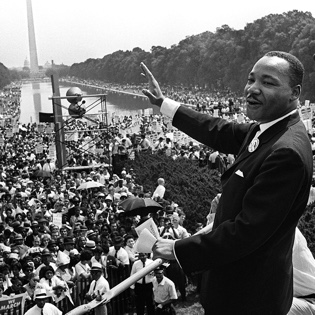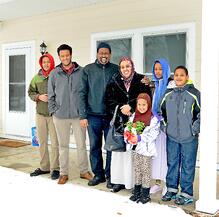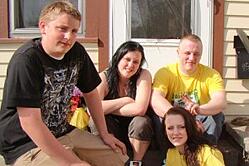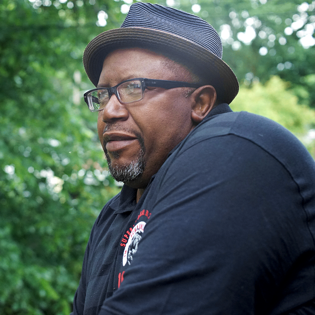Sharing What We Are Thankful For at Twin Cities Habitat for Humanity
Thanksgiving day is an invitation to think about all that we’re thankful for in our lives. My family has a tradition of writing something in a...

 Today we celebrate the life of one of our countries greatest moral leaders, Martin Luther King, Jr. He inspired the country and brought about great changes, not by earning more votes, or spending more money, or making threats. He brought about change through the power of his words, his vision, and the unstoppable energy he displayed in showing us how to bring them to life.
Today we celebrate the life of one of our countries greatest moral leaders, Martin Luther King, Jr. He inspired the country and brought about great changes, not by earning more votes, or spending more money, or making threats. He brought about change through the power of his words, his vision, and the unstoppable energy he displayed in showing us how to bring them to life.
In his historic “I Have a Dream” speech, King said, “We can never be satisfied as long as our children are stripped of their adulthood and robbed of their dignity…” Today, those words might apply to any child living in poverty and forced either into homelessness, or any family spending so much on housing that their children suffer in their nutrition, their education, their ability to access healthcare, and their opportunities to build the brighter futures most of us take for granted.
King pointed to the Declaration of Independence and the Constitution as great symbols of our country. He declared that in those documents, the “architects of our Republic” wrote a promissory note to every American that all of us would be “guaranteed the unalienable rights of life, liberty and the pursuit of happiness.” But for many Americans, that promissory note is a check that comes back stamped, “insufficient funds.”
 In Minnesota, almost one-third of all children live in homes with a high cost burden (over 30 percent of household income). For a family spending 35, 40, or 50 percent of their income, or more, on rent, there are insufficient funds to exercise their right to the pursuit of happiness, liberty, and, sometimes, even life. The pursuit instead becomes one of trying to find transportation to jobs ever further away because the family was forced to move constantly in search of less expensive places to live when rents go up. The pursuit becomes one of trying to find quality food at low enough prices to keep everyone healthy, and still have enough money to pay the rent. The pursuit becomes one of trying to help the children learn when they have to give up the support network of friends, neighbors, and concerned teachers because the family was forced to move, again. The lack of stable, affordable housing forces the future of families into bankruptcy, and it makes all of us poorer.
In Minnesota, almost one-third of all children live in homes with a high cost burden (over 30 percent of household income). For a family spending 35, 40, or 50 percent of their income, or more, on rent, there are insufficient funds to exercise their right to the pursuit of happiness, liberty, and, sometimes, even life. The pursuit instead becomes one of trying to find transportation to jobs ever further away because the family was forced to move constantly in search of less expensive places to live when rents go up. The pursuit becomes one of trying to find quality food at low enough prices to keep everyone healthy, and still have enough money to pay the rent. The pursuit becomes one of trying to help the children learn when they have to give up the support network of friends, neighbors, and concerned teachers because the family was forced to move, again. The lack of stable, affordable housing forces the future of families into bankruptcy, and it makes all of us poorer.
Martin Luther King called on us to seek justice for all of God’s children, and one of the best ways for justice to take hold is by giving all of God’s children a solid foundation to build on – the foundation of a stable, secure, affordable home for them and their families.
According to a 2012 study by the Urban Institute, when a child lives in an unstable housing situation, school changes increase, as do school absenteeism and behavioral problems. In that environment, test scores go down, graduation rates decrease, the likelihood of attending any college decreases, future earnings decline, and the test scores for other students decreases. The study showed that when children live in affordable housing, every single one of those negative trends is reversed.
 When a child and all family members are healthy, educational performance improves for children. In 2011, the Center for Housing Policy published a study detailing the effects of affordable housing on health. They stated that living in affordable housing improves health outcomes by freeing up family resources for nutritious food and health care expenditures. It also reduces stress and increases mental health levels for all family members, directly impacting the quality of their health. Well-constructed affordable homes impact health by reducing toxins, allergens and other dangers. Finally, affordable housing can alleviate overcrowding, minimizing stress levels and exposure to infectious diseases. All of these combine to reduce chronic illnesses for family members.
When a child and all family members are healthy, educational performance improves for children. In 2011, the Center for Housing Policy published a study detailing the effects of affordable housing on health. They stated that living in affordable housing improves health outcomes by freeing up family resources for nutritious food and health care expenditures. It also reduces stress and increases mental health levels for all family members, directly impacting the quality of their health. Well-constructed affordable homes impact health by reducing toxins, allergens and other dangers. Finally, affordable housing can alleviate overcrowding, minimizing stress levels and exposure to infectious diseases. All of these combine to reduce chronic illnesses for family members.
The benefits don’t stop there, the study also showed that quality, affordable housing can increase access to amenities, reduce crime, improve access to transportation, increase access to support services, and enhance a families opportunity to grow wealth – all critical components of helping children escape the chains of poverty and improving the quality of life for everyone in our communities.
 Martin Luther King spoke eloquently about the dream he had for our country, and for our children. He spoke about a broad spectrum of problems the country faced. Some of those problems have been solved, or reduced. Other problems and barriers continue. One of the problems still facing children in their “pursuit of life, liberty and the pursuit of happiness” is the critical shortage of affordable housing. That’s where Twin Cities Habitat for Humanity, and you, come in.
Martin Luther King spoke eloquently about the dream he had for our country, and for our children. He spoke about a broad spectrum of problems the country faced. Some of those problems have been solved, or reduced. Other problems and barriers continue. One of the problems still facing children in their “pursuit of life, liberty and the pursuit of happiness” is the critical shortage of affordable housing. That’s where Twin Cities Habitat for Humanity, and you, come in.
Twin Cities Habitat continues to work to make that dream a reality for more children by helping their families gain access to quality, affordable, stable homes, but we can’t do it without you. When you volunteer, or donate, or sponsor, you are participating in bringing King’s dream to life for more people.
Martin Luther King spoke to mobilize a nation to change and fully live into the promises the “architects of our Republic” made. He spoke to make it possible for everyone to cash that “promissory note.” At Twin Cities Habitat, our goals are more modest. Our hope, our dream, is that you will take a few minutes and commit to volunteer on a project, then donate a few dollars to help bring the dream to life. Doing so would be a fitting tribute to the legacy of Martin Luther King, Jr., and a step toward fulfilling the promise of our nation.
Your gift unlocks bright futures! Donate now to create, preserve, and promote affordable homeownership in the Twin Cities.

Thanksgiving day is an invitation to think about all that we’re thankful for in our lives. My family has a tradition of writing something in a...

Few legacies are more impactful than helping three families achieve their dream of homeownership.

Andre Tellis wanted to give back to his community when he served six years in the United States Army. On June 25 of this year, our community gave...